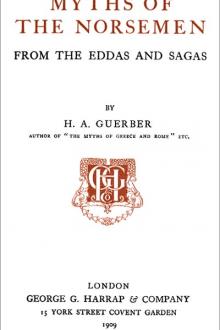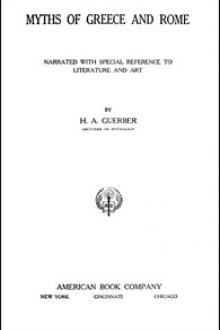Myths of the Norsemen, H. A. Guerber [ereader manga TXT] 📗

- Author: H. A. Guerber
- Performer: -
Book online «Myths of the Norsemen, H. A. Guerber [ereader manga TXT] 📗». Author H. A. Guerber
Vecha (vech′ȧ). Odin as, 164
Vedfolnir (ved-fol′nir). Falcon reporter, 13
Vegtam (veg′tam). Odin, 200
Veimer (vī′mer). Thor fords, 81, 352
Veleda (vel-ā′dȧ). Warns Drusus, 171
Veneur de Fontainebleau (vẽn-urde-fon-tān-blō). Wild Huntsman, 26
Venus. Northern equivalents for, 348, 352, 355, 363
Verdandi (vẽr-dän′dē). Norn of present, 166; beneficent ways of, 167
Vespasian (ves-pā′shan). Election of, 88
Vidar (vē′där) Parents of, 39; story of, 158–161; slays Fenris, 336; the survival of, 160, 338; comparisons, 357, 361
Vienna. Customs in, 126, 127
Vigrid (vig′rid). Last battle on plain of, 32, 228, 232, 333, 334, 338
Viking (vik′ing). Grandson of Haloge, 298; early adventures and marriage of, 299–300; second marriage of, 300; adventures of sons of, 302–304; Ægir gives Ellida to, 303
Vikings (vik′ingz). Valkyrs take, 174
Vili (vi′lē). Birth of, 4; at creation of man, 12, 347; replaces Odin, 37, 139; comparison, 344
Vindsual (vind′su-al). Father of Winter, 9
Vingnir (ving′nir). Foster father of Thor, 59
Vingolf (ving′golf). Tyr welcome in, 85
Vingthor (ving′thor). Same as Thor, 59
Vinland. Norse settlement in, 250
Virgin. Sponge called hand of, 116; health of, 137
Vitellius (vit-el′lius). Has Cheru’s sword, 87, 88
Vjofn (vyofn). Goddess of concord, 49
Volla. Same as Fulla, 47
Volsung (vol′sung). Saga of, 251, 364; birth of, 48, 252; career and death of, 251–257; descendants of, 258, 263, 266, 296
Völund (vẽl′oond). Story of the smith, 175–179, 353; arm ring, 304, 311
Völundarhaus (vẽl′oond-ar-hous′). Maze, 177; compared to Cretan labyrinth, 358
Von. River from Fenris’s mouth, 94
Vör (vẽr). Same as Faith, 50
Vrou-elde (vro͞o-eld′e). Same as Frigga, 57
Vrou-elden-straat (vro͞o-elden′-strart) Milky Way in Holland, 57
Vulcan. Northern equivalents for, 346, 358, 363
Vulder (vul′der). Same as Uller, 140
Wagner (väg′ner). Four operas from Volsunga Saga, 251
Wain. Same as Great Bear, 30
Wanderer. Same as Odin, 32
Waves. Ægir’s daughters, 187, 359
Wayland. Same as Völund, 175
Wednesday. Sacred to Odin, 41
Weldegg (vel′deg). King of East Saxony, 40
Wener (wān′er). Lake, Thorsten banished to, 302
Werewolf (wer′wulf). Sigmund a, 259
Weser (vā′zer). Rats drowned in, 27
West Saxony. Conquered by Odin, 40
Westerburg (ves′ter-burg). Ilse loves knight of the, 236
Westri (wes′trē). Dwarf supporting heavenly vault, 6
White Lady. Last appearance of, 56, 57
Wild Hunt. Leaders of, 23, 24, 26, 57, 140
Wild Huntsman. 23, 26
Will-o’-the-wisp. Mediæval superstition concerning, 247
Wind. Waves play with, 187
Wingi (wing′ē). Same as Knefrud, 291
Winilers (win′i-lerz). Story of Vandals and, 45, 349
Winter. Odin supplanted by, 38
Wode (wō′da). Same as Frigga, 57
Woden. Same as Odin, 16, 23,41
Woden’s Day. Same as Wednesday, 41
Wood Maidens. Elves known as, 249
Wuotan (wō′tan). Same as Odin, 16, 57
Wurd (wurd). Same as Urd, 167
Wyrd (wērd). Mother of Norns, 159, 160
Ydalir (ē-däl′ir). Abode of Uller, 139
Yggdrasil (ig′drȧ-sil). Creation of, 12; stags pasture on, 13; assembly under, 14; spear from, 31; Odin hangs from, 33; Thor goes to, 60; Idun falls from, 109; Bifröst reaches to, 146; Giallar-horn hung on, 148; Norns dwell under, 166; Nidhug eats, 183, 331; consumed, 336; comparison, 353
Ymir (ē′mir). Giant of fire and ice, 3; sleep of, 4; death of, 5, 230; earth created from, 5; dwarfs from, 10, 239, 345; Fornjotnr same as, 217, 232; comparisons, 217, 343
Younger Edda. Gylfi’s delusion described in the, 40
Yule. Month and festival of, 124, 128
Yule Log, 127
Yuletide, 83, 102, 127, 320, 321
Zephyrus (Zef′i-rus). Frey like, 355
Zeus (zyūs). Northern equivalents for, 349
Ziu (zū). Same as Tyr, 85
Ziusburg (zūz′berg). Same as Augsburg, 85
Each volume contains sixteen full-page illustrations after leading artists
1. Legends of Greece and Rome.
By G. H. Kupfer, M.A. Third Edition, 1907.
2. Favourite Greek Myths.
By L. S. Hyde.
3. Stories of Robin Hood and His Merry Outlaws.
Retold from the Old Ballads by J. Walker McSpadden.
4. Stories of King Arthur and His Knights.
Retold from Malory’s “Morte d’Arthur” by U. W. Cutler.
5. Stories from Greek History.
Retold from Herodotus by H. L. Havell, B.A., formerly Scholar of University College, Oxford.
6. Stories from Wagner.
Retold by J. Walker McSpadden.
7. Britain Long Ago.
Stories from Old English and Celtic Sources. Retold by E. M. Wilmot-Buxton.
8. Stories from Scottish History.
Selected from Scott’s “Tales of a Grandfather” by Madalen Edgar, M.A.
9. Stories from Greek Tragedy.
Retold by H. L. Havell, B.A.
10. Stories from Dickens.
Selected by J. Walker McSpadden.
11. Stories from The Earthly Paradise.
Retold from William Morris by Madalen Edgar, M.A.
12. Stories from the Æneid.
Retold from Virgil by H. L. Havell, B.A.
13. The Book of Rustem.
Retold from “Shah Nameh” by E. M. Wilmot-Buxton.
14. Stories from Chaucer.
Retold by J. Walker McSpadden.
15. Stories from the Old Testament.
Retold by S. Platt.
16. Stories from the Odyssey.
Retold by H. L. Havell, B.A.
17. Stories from the Iliad.
Retold by H. L. Havell, B.A.
18. Told by the Northmen.
Retold from the Eddas and Sagas by E. M. Wilmot-Buxton.
19. Stories from Don Quixote.
Retold by H. L. Havell, B.A.
A List of Prices, etc., will be sent to any address.
The Myths of Greece & Rome
Their Stories, Signification, and Origin
By H. A. GUERBER
With Sixty-four Exquisite Full-page Illustrations, including the best works of Lord Leighton, Sir E. Burne-Jones, Solomon J. Solomon, G. F. Watts, Herbert Draper, Henrietta Rae, Harry Bates, Hon. John Collier, Sir E. J. Poynter, Michael Angelo, Raphael, Rubens, Canova, Guido Reni, Phidias, Bernini, Titian, Velasquez, etc. etc.
The Bookman says:—
The Nation says:—
The Scotsman says:—
The Educational News says:—
The Aberdeen Free Press says:—
Uniform with “The Myths of Greece and Rome” and “Myths of the Norsemen.”
Myths & Legends of the Middle Ages
By H. A. Guerber
With Sixty-four exquisite Full-page Illustrations from important works of great artists
The object of this work is to familiarize students with the myths and legends which form the principal subjects of mediæval literature, and whose influence is everywhere apparent in the subsequent history of literature and art. Following the





Comments (0)